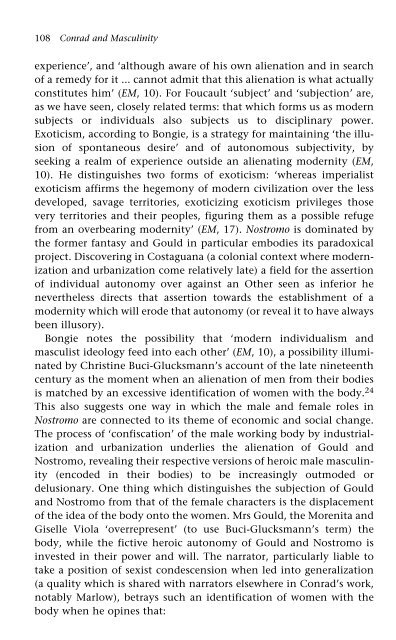Conrad and Masculinity
Conrad and Masculinity
Conrad and Masculinity
Create successful ePaper yourself
Turn your PDF publications into a flip-book with our unique Google optimized e-Paper software.
108 <strong>Conrad</strong> <strong>and</strong> <strong>Masculinity</strong><br />
experience’, <strong>and</strong> ‘although aware of his own alienation <strong>and</strong> in search<br />
of a remedy for it ... cannot admit that this alienation is what actually<br />
constitutes him’ (EM, 10). For Foucault ‘subject’ <strong>and</strong> ‘subjection’ are,<br />
as we have seen, closely related terms: that which forms us as modern<br />
subjects or individuals also subjects us to disciplinary power.<br />
Exoticism, according to Bongie, is a strategy for maintaining ‘the illusion<br />
of spontaneous desire’ <strong>and</strong> of autonomous subjectivity, by<br />
seeking a realm of experience outside an alienating modernity (EM,<br />
10). He distinguishes two forms of exoticism: ‘whereas imperialist<br />
exoticism affirms the hegemony of modern civilization over the less<br />
developed, savage territories, exoticizing exoticism privileges those<br />
very territories <strong>and</strong> their peoples, figuring them as a possible refuge<br />
from an overbearing modernity’ (EM, 17). Nostromo is dominated by<br />
the former fantasy <strong>and</strong> Gould in particular embodies its paradoxical<br />
project. Discovering in Costaguana (a colonial context where modernization<br />
<strong>and</strong> urbanization come relatively late) a field for the assertion<br />
of individual autonomy over against an Other seen as inferior he<br />
nevertheless directs that assertion towards the establishment of a<br />
modernity which will erode that autonomy (or reveal it to have always<br />
been illusory).<br />
Bongie notes the possibility that ‘modern individualism <strong>and</strong><br />
masculist ideology feed into each other’ (EM, 10), a possibility illuminated<br />
by Christine Buci-Glucksmann’s account of the late nineteenth<br />
century as the moment when an alienation of men from their bodies<br />
is matched by an excessive identification of women with the body. 24<br />
This also suggests one way in which the male <strong>and</strong> female roles in<br />
Nostromo are connected to its theme of economic <strong>and</strong> social change.<br />
The process of ‘confiscation’ of the male working body by industrialization<br />
<strong>and</strong> urbanization underlies the alienation of Gould <strong>and</strong><br />
Nostromo, revealing their respective versions of heroic male masculinity<br />
(encoded in their bodies) to be increasingly outmoded or<br />
delusionary. One thing which distinguishes the subjection of Gould<br />
<strong>and</strong> Nostromo from that of the female characters is the displacement<br />
of the idea of the body onto the women. Mrs Gould, the Morenita <strong>and</strong><br />
Giselle Viola ‘overrepresent’ (to use Buci-Glucksmann’s term) the<br />
body, while the fictive heroic autonomy of Gould <strong>and</strong> Nostromo is<br />
invested in their power <strong>and</strong> will. The narrator, particularly liable to<br />
take a position of sexist condescension when led into generalization<br />
(a quality which is shared with narrators elsewhere in <strong>Conrad</strong>’s work,<br />
notably Marlow), betrays such an identification of women with the<br />
body when he opines that:




